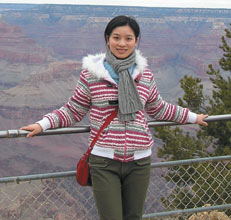| Trading Places |
| http://www.sina.com.cn 2004/11/24 18:28 thats China |
Southern Comfort
Colorado native Peter Nestor enjoyed the good life in China's Spring City Most students coming to China choose either Beijing or Shanghai to further their language studies. American Peter Nestor chose Kunming, capital of Yunnan Province, for a semester abroad in 2000. "I had never heard of Kunming before my advisor suggested it to me," says Nestor, now 25. "It had a nice ring to it in Chinese and is on the same latitude as Miami - so why not?" His first day in Kunming set the tone for the rest of his experience: Stumbling out of a three-day train journey in the middle of February, Nestor was greeted by blue skies, blossoming flowers and streets lined with palm trees - not exactly your typical Chinese scenery. "Oh my god," he remembers thinking. "I'm not in China." After settling in, he took an afternoon stroll around Lake Cui in the center of the city. While on his walk, he ran across men selling mutton kebabs, or chuanr. When he struck up a conversation, instead of being greeted with a price, Peter received several chuanr free of charge. "Like in the United States, you get a sense of Southern hospitality [in Kunming] that you don't often get in the bigger cities," he says. For a foreigner studying Chinese, though, Kunming had its downsides. Though city residents - like in the rest of China - are officially required to learn Mandarin in schools, most communicate in the local dialect. "When I was in public places, I couldn't understand conversations between native Chinese," Nestor says. Nestor, who now lives in Shanghai, kept himself busy during the semester by co-hosting a television program on tourism and culture. The show required him to travel around Yunnan Province and participate in local traditions, like the Water Splashing Festival of the Dai minority. "I didn't know what to expect," he says. "I thought it was just another festival - I'd get splashed a little and they'd wish me good luck." It turned out to be all-out water war. "People without money to put food on their plate, pulled out these 300 yuan Supersoakers and water cannons," he says. As the only foreigner present, Peter was the obvious target. He left the festival thoroughly drenched. - Duncan Willson Urban Scholar
Tong Ming finds a wealth of experience on Chicago's South Side Though she's studying at one of the most prestigious universities in the U.S., Tong Ming sees her time there more as a life experience than just a chance to further her career. "I didn't think much about job prospects," she says. "I just want to do what I like to do." The 26-year-old native of Wuhan, now pursuing a Master of Public Policy (MPP) at the University of Chicago, considers the cultural perspective she can gain by living abroad just as important as the degree she'll earn. "Studying in the U.S. is part of my dream of going around the world to see how people different from [the Chinese] live and think," Tong says. "I want to have a close look at Western culture and society and compare them with my own, to form an objective perspective on the world." Having arrived in Chicago for her two-year course just last September, Tong has found the diversity of American society to be impressive. "I haven't felt like anyone has treated me like a foreigner on campus," she says. "The United States is a country of immigrants. So people simply don't treat foreigners differently in daily communication." Sometimes she might wish they did. Though Tong speaks excellent English, she still finds it difficult to communicate with her American classmates at times. "When American students talk among themselves, I understand only 60 percent of what they say, because they use a lot of slang and phrases related to the cultural background," she says. The process of discovering another culture has not been without its share of confusing moments. "The first time I called a local telephone company to establish a new phone line in my apartment, the operator asked me to choose from a number of plans, which is unheard of in China," Tong recalls. "I was totally at a loss. I decided to go to the company's website and research the basic information before I called back." Though she's enjoying life in her host country, life on Chicago's South Side has left her with no illusions. "Some people in China take America as a heaven, but in my eyes the level of comfort in China's cities today doesn't really lag behind," she says. "The outskirts of Chicago look pretty shabby and old. There are a lot of beggars. The dirtiness of the slum areas is rarely seen even in Chinese cities. I was a little disappointed by this - and so were many of the other Chinese students I know." -Jason Subler Renaissance Girl
Beijing student Lillian Lardy tackles the academic, professional and dramatic American Lillian Lardy isn't your typical student abroad. Though she's only been in China since September, she's already attended class at a Chinese university, found a part-time job and acted in a Chinese film. "I started studying Chinese in high school, but it was very cultural," she says. "We learned about mooncakes and the story of the white snake. Stuff like that." In 1998, still in high school, she took her first trip to China, a whirlwind tour through Beijing, Shanghai, Xi'an and Inner Mongolia. In college, she continued her study of Chinese. Now, in the downtime between her undergraduate education and law school, she's returned to China on a fellowship to brush up on her Mandarin. Her first impression of Beijing reflected what she missed on her first fly-by trip through China. She was surprised at the gap in salaries and standards of living she saw in one city. "You can go out one night and feel like you are in any cosmopolitan city in the world," she says. And yet when she'd return to her campus at Beijing Normal University, she'd feel like she was in "a third world country." At school, social interactions in the international dormitory where Lardy lived for five months were challenging. "There were no common hanging-out areas. There was the bathroom, but no one hung out there," she joked. And because most of the other students didn't speak English or Chinese it was tough for group dorm activities to get off the ground. But in an international town like Beijing, language exchange opportunities abound - though not always in Chinese. One evening, Lillian attended a dinner at a professor's house with a German friend. Her friend spoke little Chinese, but was fluent in Spanish and French. "Luckily, there were [Chinese] professors of both French and Spanish at the meal," she says. What followed was a maddening exchange of Chinese and Spanish and French and English, as the two students and three professors hammered out one conversation after another. Her experiences extend well beyond the academic: Only a month after arriving in China, Lardy was offered a role in a film. She hesitated, then accepted. What was supposed to be a painless three-hour shoot, turned into an eight-hour nightmare. "We were driven two and a half hours out of the city and fed airline food," she says. It wasn't all bad: Two other study-abroad victims - one from Russia, the other from Haiti - were along for the ride. Though the three could barely communicate, the three women bonded during the experience and became friends. - D.W.
|
|
|
|
|
|
| Annotation |
| 新闻查询帮助 | |
| 热 点 专 题 | ||||
| ||||
|
教育频道意见反馈留言板 电话:010-62630930-5178 欢迎批评指正
新浪简介 | About Sina | 广告服务 | 联系我们 | 招聘信息 | 网站律师 | SINA English | 会员注册 | 产品答疑
Copyright © 1996 - 2004 SINA Inc. All Rights Reserved
版权所有 新浪网![]() 北京市通信公司提供网络带宽
北京市通信公司提供网络带宽


